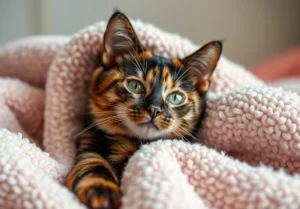Some cats hate being under blankets, and it can be puzzling to understand why. Could it be a matter of personal preference, a sensory issue, or something else entirely? Let’s explore the reasons behind this curious behavior.
Physical Discomfort
Some cats may hate being under blankets because of the physical discomfort it can cause. Cats have a higher body temperature than humans, so being under a blanket can quickly lead to overheating. This can make them feel uncomfortable and restless, prompting them to scramble out from under the covers. Additionally, blankets may restrict a cat’s natural movement, making them feel confined or uncomfortable. If your cat is constantly struggling to get out from under the blanket, it may be a sign that they are feeling physically uncomfortable.
Fear of Enclosure
For some cats, being under a blanket can trigger feelings of vulnerability or claustrophobia. Cats are naturally wary of enclosed spaces where they may feel trapped or unable to escape if a threat arises. Being under a blanket can mimic this feeling of enclosure, causing some cats to panic and struggle to break free. If your cat becomes agitated or fearful when placed under a blanket, it may be best to respect their boundaries and avoid forcing them into a situation that causes them distress.
- One unique insight: Cats may also dislike being under blankets because it dampens their natural instinct to remain alert and vigilant to their surroundings. By covering them with a blanket, you are removing their ability to monitor their environment, which can be stressful for some felines.
Preference for Open Spaces
Cats have a natural instinct to seek out open spaces for safety and security. In the wild, they rely on their surroundings to protect themselves from potential predators. Therefore, some cats may feel uncomfortable or anxious when they are confined under a blanket, as it goes against their innate desire for open spaces. This aversion to enclosed areas is a way for cats to maintain control and be ready to react to any potential threats.
Sensory Sensitivities
Some cats may be sensitive to the texture, weight, or smell of blankets, which can cause them to avoid being underneath. The texture of the fabric may feel unpleasant on their fur, the weight of the blanket might make them feel trapped or restricted, and the scent of the material could be overpowering to their sensitive noses. These sensory sensitivities can lead to a strong dislike for being under blankets, as it can be an uncomfortable and overwhelming experience for them.
Additional Insight: Here are a few tips to help your cat feel more comfortable with blankets: 1. Introduce Blankets Gradually: If your cat is hesitant about blankets, introduce them slowly and positively to help them acclimate to the new sensation. 2. Offer Different Materials: Experiment with different types of blankets to find one that your cat prefers in terms of texture and weight. 3. Keep it Optional: Respect your cat’s preferences and allow them to choose whether they want to be under a blanket or not.
By understanding your cat’s preferences and sensitivities, you can create a more comfortable and enjoyable environment for them at home.
Temperature Regulation
Cats are masters of temperature regulation, thanks to their thick fur and efficient circulatory system. When a cat feels warm, it may seek cooler spots to avoid overheating. Therefore, some cats may not enjoy being under blankets as it can trap heat and make them uncomfortable. If your cat prefers to stay on top of blankets rather than underneath, it may be because they are trying to regulate their body temperature more effectively.
Psychological Factors
Past experiences, stress, and anxiety can also play a role in a cat’s aversion to being under blankets. If a cat had a negative experience while under a blanket, such as feeling trapped or restricted, they may develop a fear or discomfort associated with being under covers. Similarly, a cat that is anxious or stressed may feel safer and more in control when they can easily move around and escape from potential threats, which may be hindered when under a blanket.
Additional Unique Insight:
- Some cats may dislike being under blankets due to their natural instinct to always stay alert and aware of their surroundings. Being under a blanket can hinder their ability to perceive potential dangers, making them feel vulnerable and anxious.
Behavioral Conditioning
Have you ever wondered why some cats seem to detest being under blankets? Well, one possible reason could be behavioral conditioning. Imagine this: maybe your cat had a not-so-pleasant experience under a blanket in the past. Perhaps they felt trapped or uncomfortable, leading them to develop a negative association with blankets. Over time, this negative conditioning may have resulted in your feline friend avoiding blankets altogether. It’s like if you burned your tongue on hot soup once – you might steer clear of piping hot meals in the future. So, if your cat steers clear of blankets, it could be due to past experiences shaping their current behavior.
Individual Preferences
When it comes to why a cat might dislike burrowing under blankets, it’s essential to remember that each cat is unique. Just like how some people can’t stand pickles on their burgers while others can’t get enough, cats also have their own preferences. While some cats may enjoy the cozy feeling of being nestled under a blanket, others might prefer the freedom of movement and visibility that comes with staying on top. It’s all about personal preference – kind of like how you might prefer tea over coffee. So, if your feline friend turns their nose up at blankets, it could simply be a matter of them having their own unique tastes.
Fun Fact: Cats’ Natural Sleep Habits
Did you know that cats are crepuscular animals, meaning they are most active during dawn and dusk? This natural behavior is influenced by their ancestors, who were hunters and most active during these times of day. Because of this, cats have evolved to have unique sleeping patterns that don’t always require them to burrow under blankets like other animals.
Cats are known to be light sleepers, constantly aware of their surroundings even when they appear to be resting. This heightened sense of alertness stems from their instinctual need to be on the lookout for potential prey or dangers. Therefore, some cats may not feel comfortable being completely covered by a blanket as it can inhibit their ability to quickly detect any changes in their environment.
Another interesting fact is that cats are experts at thermoregulation, meaning they can adjust their body temperature by moving to warmer or cooler spots. This ability allows them to find the perfect temperature to rest without the need for additional layers like blankets. So if your cat prefers to sleep on top of rather than under a blanket, it may be due to their natural sleeping habits and self-regulating abilities.
Next time you see your feline friend napping in the open instead of under a cozy blanket, remember that it’s just their innate behavior at play!
Reasons Why Some Cats Hate Being Under Blankets
- Preference for Independence: Cats are known for their independent nature and may prefer to have the freedom to move around without feeling confined under a blanket.
- Natural Instincts: Cats are instinctual animals with a strong sense of self-preservation. Being under a blanket can make them feel vulnerable or trapped, going against their survival instincts.
- Heat Regulation: Cats have a higher body temperature than humans, and some may find being under a blanket too warm and uncomfortable. They have a natural ability to find their preferred sleeping temperature without the need for extra insulation.
- Sensitive Whiskers: Cats’ whiskers are highly sensitive and play a crucial role in their spatial awareness. Feeling compressed under a blanket may disturb their whiskers and cause discomfort.
Keep these factors in mind when trying to understand why your cat may not enjoy snuggling up under a blanket. Each cat is unique, so it’s essential to respect their individual preferences when it comes to sleep and comfort.
Alex, a passionate animal lover, has experience in training and understanding animal behavior. As a proud pet parent to two dogs and three cats, he founded AnimalReport.net to share insights from animal experts and expand his knowledge of the animal kingdom.




